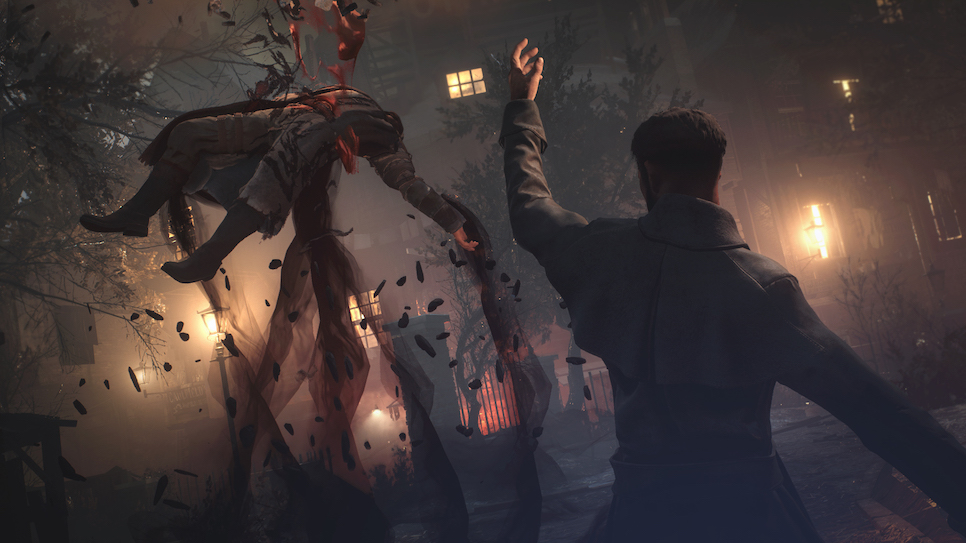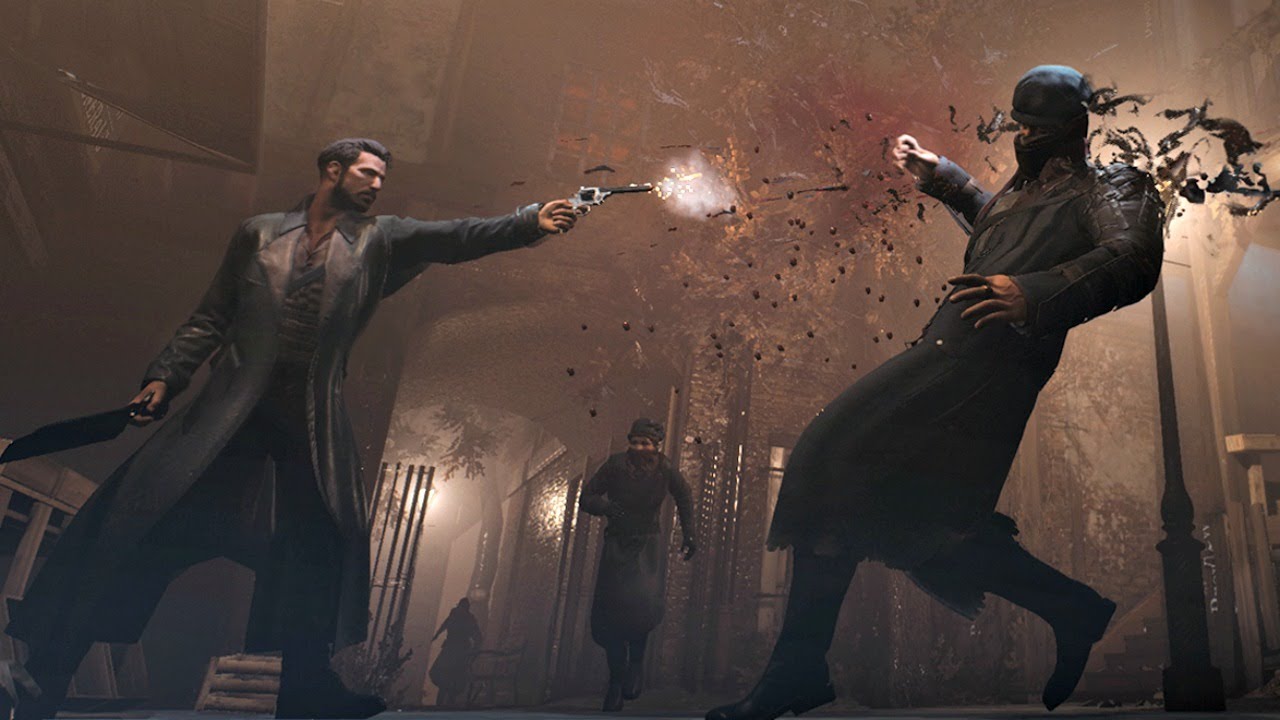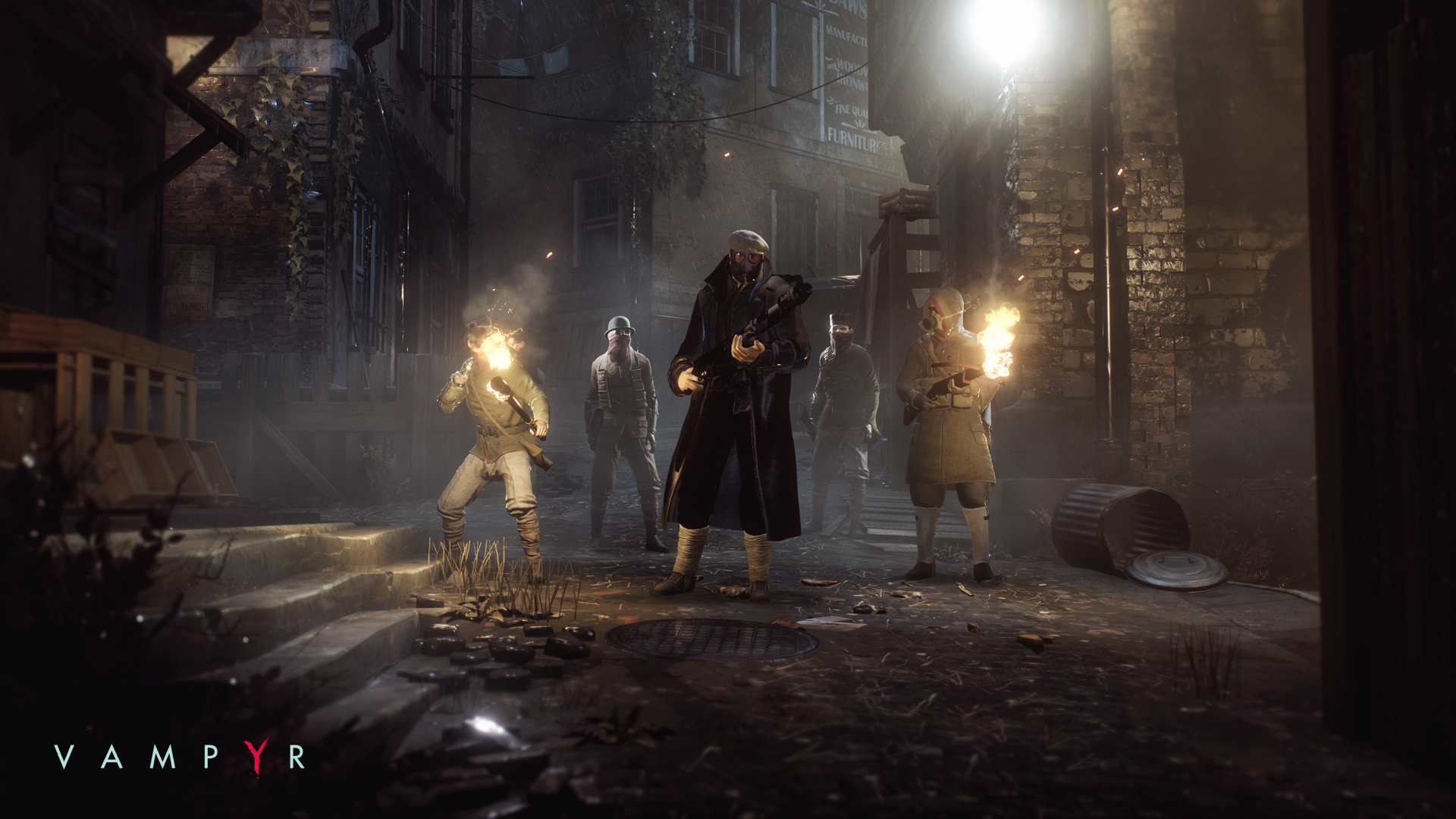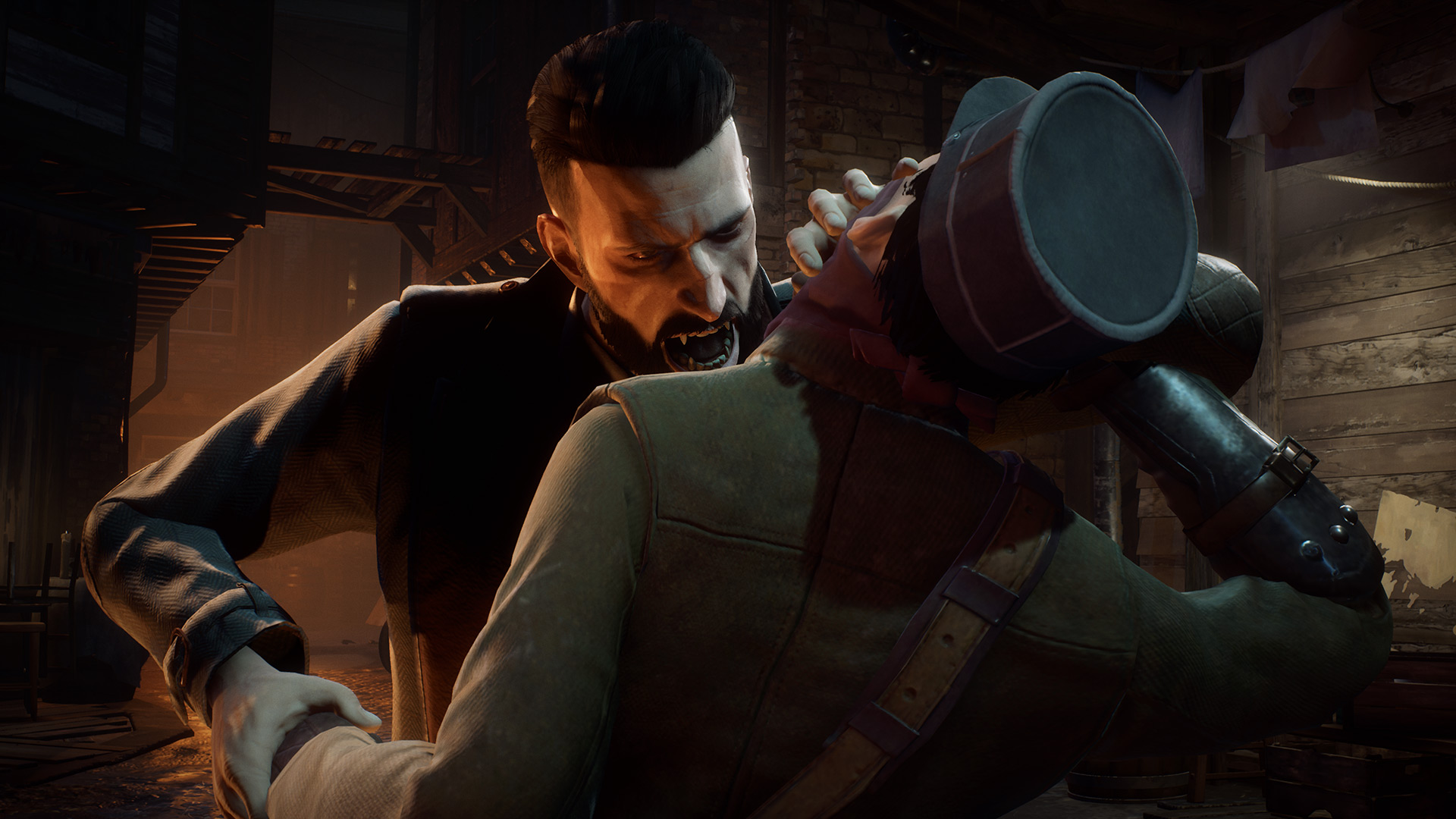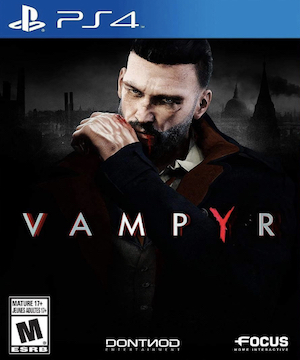
Very rarely does one come across a video game that makes its players face the consequences their actions. It is not something games usually do. Killing an NPC is like a reflex to us, an instinctive action we don’t even spare a second thought for, and the major choices we make in most games rarely have any far-reaching or permanent effects. In that regard, Vampyr is very different- it is a game that makes you own up to your actions, a game that puts you at a crossroads almost constantly, with each fork in the road pulling you fiercely in its direction. Through both, gameplay choices and narrative developments, Vampyr constantly forces you to make tough decisions, and with great aplomb, it makes you face the consequences of each and every one of these actions.
Vampyr establishes the fact that this is a game of contradictions and tough decisions right from the get go. You play as Jonathan Reid, a World War I veteran and a doctor who has returned home to London after many years away, coming back to a city that is very different from the one he left- a city ravaged by the aftershocks of a great and terrible war, and a city that is also crumbling from the inside as it deals with the outbreak of a deadly epidemic of the Spanish Influenza. In light of this, Jonathan’s homecoming was bound to be a troubling one anyway, but things grow worse still right at the outset of the game, as he finds that, in the aftermath of a deadly attack, he’s been cursed with the powers and maledictions of a vampire. And so it is that he finds himself torn between his duties of upholding the Hippocratic Oath as a doctor, and his thirst for fresh blood to sustain himself as a vampire.
"Through both, gameplay choices and narrative developments, Vampyr constantly forces you to make tough decisions, and with great aplomb, it makes you face the consequences of each and every one of these actions."
It’s a setup that is immediately arresting. Right from the beginning, after the game settles down into its rhythm after a brief introductory sequence, Jonathan’s inner struggle between these two facets of his persona is captivating to witness and be a part of. Additionally, the city of London itself is an excellent backdrop for the kind of game Vampyr is. It’s always dark (which makes sense, since you, as a vampire, can’t go out during the day), it’s run-down, and it’s an absolute mess, ravaged not only by the effects of a global war, but also of a deadly epidemic. It’s an oppressively gothic and moody atmosphere, which is exactly the kind of tone you want in your vampire stories. The understated and wonderfully composed soundtrack also contributes to that atmosphere incredibly well.
Also worthy of applause is how effectively and consistently Vampyr makes use of Jonathan’s struggles within the confines of both its narrative and its gameplay loop. Throughout the course of the game, you gain EXP from killing enemies and taking on quests, but the rewards for these activities are relatively miniscule. Because, of course, as a vampire, the main source of your strength is the blood of innocents, and the vast amounts of EXP you gain from sinking your incisors into a human’s throat and drinking of their blood are always enough to make you salivate as the player. That’s because Vampyr is a game that is as difficult as you want it to be – there are no difficulty levels to choose between here – and the only way to make the game easier is by levelling up. And while the prospect of killing NPCs in order to use the EXP they render to power up Jonathan’s abilities is always a very attractive one, Vampyr makes sure to balance it out with actual, weighty consequences.
It accomplishes that through several means, chief among them being the fact that all of your potential victims are more than just faceless, characterless NPCs. Every inhabitant of Vamyr’s London is a person in and of themselves. They each have their own stories, their own motivations, their own social webs of relationships and interactions, their own routines. Every character you meet feels like an actual, real person. If you want to kill one of these characters, you have to learn more about them, and doing so opens up windows into who they are as people, what makes them tick, what makes them- them.
"Right from the beginning, after the game settles down into its rhythm after a brief introductory sequence, Jonathan’s inner struggle between these two facets of his persona is captivating to witness and be a part of."
It’s a wonderful process, because the more you learn about these people, the less inclined you might become to wanting to kill them, but the more you learn about them, the more EXP they potentially give out. Even if you’re able to reconcile your moral quandaries and dilemmas, the game still presents you with actual consequences on paper that you will have to live with for the entirety of your playthrough. Killing a merchant character might mean you will no longer have access to the wares they’re selling. Killing a character would mean you’re locking yourself out of any and all quests they may have given out during the course of the entire game.
Killing a character could also have an impact on other characters- each character has a specific role to play in the game’s social structure, and killing one character would leave behind a void in that web, making other characters react to it. For instance, would you choose to kill a nurse who is blackmailing people, but is doing to so to provide free medical aid to the poor and the helpless? Or would you kill a doctor who would render vast amounts of EXP, but is crucial to the functioning of a large hospital that stands as one of the last defences of the city against the flu epidemic?
Something else you constantly have to contend with is the health of the city of London, both on a macro and micro level. The citizens of London might often come down with sicknesses, which you can cure by giving them medicines- which, in turn, increases the quality of their blood and the amount of EXP they would potentially give out. If too many citizens in any of London’s four districts die – either through sickness or through Jonathan’s vampiric actions – that district plunges into absolute chaos and becomes overrun by rampant disease and destruction, which locks out any quests and characters that district may have housed.
"Killing a character could also have an impact on other characters- each character has a specific role to play in the game’s social structure, and killing one character would leave behind a void in that web, making other characters react to it."
And so Vampyr forces you to not only make one tough decision after another, but also to deal with the effects of each of these decisions, both small and large, all of them decidedly and unequivocally permanent. It presents the mechanics of choice and consequence like few games manage to do, so that playing the game feels like a much more immersive and involving activity than you’d initially expect. And if Vampyr were a game that was completely and absolutely focused on this constant loop of choices and consequences, it would be damn near perfect- mechanically speaking, at least.
Unfortunately, a large part of the game is also very combat-centric, and Vampyr’s combat is, without a doubt, one of its biggest weaknesses. That’s not to say combat in the game is broken. No, for what it is, it works fairly decently- at worst, it’s a chore, and at best, it’s serviceable. Unfortunately, there’s not a lot of variation involved, and it quickly becomes repetitive, turning into an exercise in patience. More often than not, you will be mindlessly mashing buttons to get through combat encounters to get to the real meat of the game. And that’s a real disappointment, because in comparison to the rest of the game, which is deeply immersive and keeps you thoroughly engaged, combat feels like the exact opposite, in that it requires almost minimal thought and the most cursory of involvement. It feels like it’s there because for some reason it had to be, not because it’s an intrinsic part of the game itself. Fortunately, even though a significant chunk of the game is cumulatively combat-oriented, almost all of the sections are over fairly quickly, so even though the combat is quite dull, it never hampers the game’s momentum and pacing all that significantly. The main focus, most of the times, remains squarely on Jonathan’s dual life as a vampiric doctor.
The one and perhaps the only area that lets down the decision-making aspects of the game to some extent, is the writing. That’s not to say that the game’s narrative is poorly written, or that any of its characters are – quite the opposite, in fact – but that the actual writing itself often feels awkward and clumsy. The dialogue between characters often feels stilted and forced, while the inner monologues of Jonathan can tend to feel like they’ve been written by a high school English student. It’s particularly noticeable because of how much at odds it is with the game’s characters – which are mostly complex, well developed personalities – and its setting – which is very consistent in tone and atmosphere. It also doesn’t help that the game’s voice acting is quite inconsistent. While some of the characters have been voiced pretty well, many others sound bland and dreary, or unnecessarily over-exaggerated.
"Vampyr presents the mechanics of choice and consequence like few games manage to do, so that playing the game feels like a much more immersive and involving activity than you’d initially expect."
Vampyr is also a game that suffers from some technical issues. Visually, the game is pretty solid, with a wonderful art style that complements its gothic and oppressive atmosphere excellently, and technical visuals that may not necessarily be outstanding, but do their job exactly how they’re supposed to. However, it is held back by some janky animations every now and again, such as a few lip syncing issues, awkward looking facial animations, not to mention some minor visual bugs. Considering the fact that this is hardly a game with a AAA budget, though, and is made by a fairly small indie development studio, such issues were to be expected, and it should be noted that rarely in my entire playthrough did I ever come across anything that was even close to being game-breaking.
Vampyr is an imperfect game, that much is pretty clear even at first glance, but it is also a deeply ambitious and thoroughly engaging one. It constantly presents players with a string of truly tough decisions, both through its narrative and its gameplay, and then actually makes you live with the consequences of every decision you make, sometimes in truly surprising ways. Its atmospheric setting and its complexly layered gameplay loop are let down by some issues in the writing department and some underwhelming combat, but such issues aren’t nearly enough to prevent it from being an incredible and unique experience.
This game was reviewed on the PlayStation 4.
Moody, gothic atmosphere makes 1918's London an incredible setting; A vast number of layered and well-developed characters; Engaging, immersive gameplay loop; Your decisions carry actual weight and consequences, leading to surprising levels of player agency; Captivating narrative setup.
Dull, uninspired combat; Some visual bugs; Lip syncing issues and awkward facial animations; Inconsistent quality of writing.









